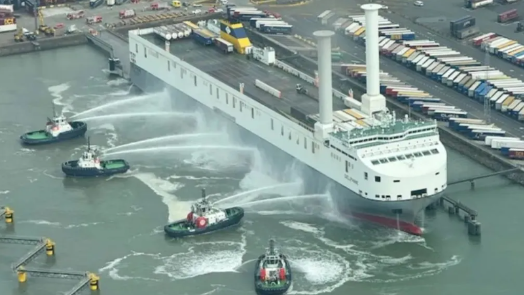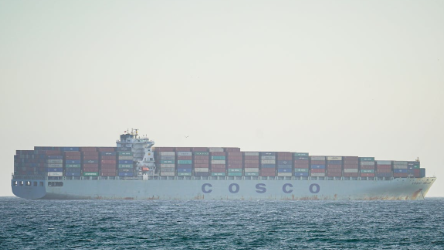Some major European ports are currently experiencing vessel congestion, though skepticism remains over whether this is linked to the rapidly escalating trade war between the U.S. and China.
However, the possibility cannot be ruled out in the coming months.
A recent article in *The Sunday Times* titled *"European Ports in Chaos as Trade War Leaves Ships in Limbo"* reported that hundreds of vessels are queued up at maritime gateways in Germany, Italy, the Netherlands, and the UK due to retaliatory tariffs. As part of these measures, a $1 million fee is also planned for China-linked ships calling at U.S. ports.
A shipping executive told the newspaper, *"Cargo from Asia is either being canceled or diverted elsewhere."* Meanwhile, a port source revealed that a perfume and luxury goods retailer, which had originally planned to ship goods from China to the U.S. with a stopover in Europe, has now decided against completing the journey. Instead, the company intends to store the goods in Europe and attempt to sell them there to avoid tariffs.
The article also cited data from shipping analytics firm MarineTraffic, showing that in the first week of April, 226 vessels docked at Antwerp, Belgium—compared to just 34 in the same period last year. Similarly, 51 ships called at Southampton, up from 12 previously. The report emphasized that these figures include all vessel types, not just container ships carrying consumer goods. It further noted that 99 ships entered Rotterdam in the same week, a sharp rise from 17 a year earlier. Barcelona saw a similar surge, with annual vessel calls jumping from 16 to 96. In Hamburg, 124 ships docked in early April versus just 11 last year.
Diverging Views on Congestion
However, when contacted by media, the Port of Rotterdam—Europe’s largest container hub—*"did not recognize the MarineTraffic data."*
A spokesperson added, *"We handle 28,000 seagoing vessels annually, so just 17 per week would be remarkable."* Moreover, *"ships traveling from China to the U.S. typically take the transpacific route, not the transatlantic. Currently, Rotterdam is not crowded with vessels, nor are U.S.-bound goods being unloaded here."*
Maritime analysts consulted by media also expressed doubts about the MarineTraffic figures cited in *The Sunday Times*. *"I don’t recognize this—it needs verification,"* said Peter Sand, Chief Analyst at Xeneta, a freight benchmarking and market intelligence platform. He argued that congestion at some major European ports cannot be attributed solely to the trade war or to ships originally bound for the U.S. rerouting due to tariff threats. Instead, he pointed to a combination of factors: newly deployed alliance vessels, sporadic industrial action, adverse weather, and overcrowded container yards, all contributing to *"massive delays and operational disruptions."*
*"While U.S. importers are busy sourcing from non-Chinese Asian countries and frontloading shipments, will we see a flood of Chinese goods arriving in Europe within the next 48 to 60 days? Time will tell,"* Sand noted.
Record-High Deployed Capacity?
According to analysts at Sea-Intelligence, the market may soon witness all-time-high shipping capacity from Asia to Northern Europe, surpassing the record set in Week 10 of 2021—when COVID-19 was wreaking havoc on global supply chains. This time, the tariff war is likely driving manufacturers, importers, and exporters worldwide to reassess their short-, medium-, and long-term strategies.
Meanwhile, the U.S. Trade Representative is expected to propose details this week on the controversial levy targeting China-linked vessels calling at American ports—a move ostensibly aimed at revitalizing the U.S. shipbuilding industry.
Major global shipping firms, along with key players in the oil and gas sector, have fiercely opposed the measure, warning it could drastically inflate freight costs. Intensive lobbying efforts are underway to persuade the Trump administration to scrap the proposed fees.

Last
Breaking! Major Fire on Cargo Ship, Around 70 Vehicles Destroyed!
A fire broke out on a ro-ro cargo ship at the Port of Zeebrugge, Belgium, on Wednesday, burning approximately 60-70 vehicles. The

Next
Major Personnel Changes at COSCO SHIPPING Holdings
Resignation of Vice Chairman Mr. Chen Yangfan, Nomination of Mr. Zhang Feng as Executive Director Candidate, and Appointment of Ms



